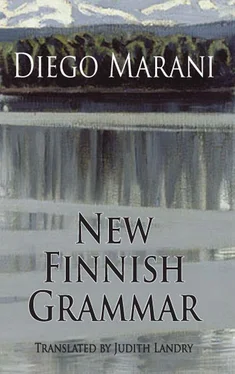More than a month had gone by since I had received Ilma’s letter. Ever since that afternoon, I’d kept it in the inner pocket of my jacket, where I kept the handkerchief with my initials. I had reread it a thousand times until I had learned it by heart, and I had only to come across a verb, an adjective, even just a pair of prepositions in my notebook for a whole line of it to flash into my mind. I had asked Koskela about every single word I had not understood. I had made an orderly list of them in my notebook and, in order to be sure that nothing that Ilma had said escaped me, I had looked into their most far-fetched and most unlikely meanings. Time after time, before falling asleep at night, I had been tempted to reply. I had begun to sketch out a few phrases in my mind: ‘Dear Ilma, all that you say is true,’ I would begin, but could never go any further. I slipped the second letter to arrive into the same pocket as I had put the first, but a whole day went by before I could bring myself to open it. Only in the evening, after I’d filled myself with koskenkorva at the Kämp, did I walk to the hill in Kaivopuisto Park and there, under the tree of happy memories, now in full leaf, I unstuck the envelope and began to read.
Viipuri, 22 May 1944
Dear Sampo,
I am saddened by your silence, but all in all I am not surprised. Because I was presumptuous enough to think that I could help you, I thrust a friendship upon you that may have been unwelcome, and I must accept your rejection of it. In reality it is I who need you, and once again I misjudged matters. What you need is a past, whereas what I need is a present, something to distract me from the fear and anxiety with which I live. Don’t read these words thinking that I want to help you yet again. I am not asking for a reply; just let me write to you. With you — and in reality I know nothing about you except your name — I feel an unusual sense of intimacy which is somehow liberating and life-enhancing; it’s also something I’ve never felt with people I thought that I knew well. Thinking of you gives me a new lightness, lets me float free of the ballast of memory. Strangely, what you are so doggedly in search of drags me down, it is a form of slavery to which I cling. What others remember of us is in fact nothing more than the effect that we have had on them. We spend our lives brushing up against our fellow humans without ever really knowing them. Even the knowledge we build up of those people and things which are dearest to us is purely matter-of-fact; we know them as the entomologist knows the butterflies he has pinned on to a sheet of balsa wood. We can describe the colour of their eyes or hair, we know them from a distance as they walk through a crowd, their features are instantly recognizable, as is their characteristic smell, or voice. Their absence makes us feel some part of us is missing. Yet they are never truly ours: our wish to possess them in fact destroys them, denies them a life of their own. In our vain desire to soften the mystery of death, we seek to possess, to soak up as much life as we can, without realizing that in this way we are killing all that we think we love. Do you remember my tree in Kaivopuisto Park? There are many ways of seeing it: you can regard it as a network of lymph vessels, of veins, of roots teeming with sap, linked up to a living nucleus which, through the breathing leaves, establishes and maintains a flow of matter between earth and sky, between inert matter and air. But you can also reduce it to a pure number, make it into a law of chemistry which governs the way things decompose and are transformed. In both cases, different though they are, that tree will still be something outside ourselves, something we are observing, something we know, perhaps, but with which we do not have any relationship. Establishing a relationship, that’s what we’re talking about: agreeing to move towards the other without taking possession of them, without making them conform to what we expect of them. That’s what I’d like to do with you. Only with you could such a relationship be possible — for the simple reason that there is nothing I can steal from you. When two people meet, they immediately want to ‘declare’ their past, as you declare alcohol and cigarettes at a frontier post: they want to ‘clear’ it, to put it at the disposal of the new relationship on which they are embarking. But that’s not the right way to go about things; it’s simply a rather presumptuous way of claiming a right to the other person’s past by scraping together memories which are not our own. You yourself have no past, so you have no memory to put at anyone’s disposal. My tree of happy memories, on the other hand, is a monument of self-centredness, a weight which drags me down. Did you ever go back to it? It must be all in leaf by now. There you are — I belittle it and then immediately wish I hadn’t done so! Without someone else beside us, watching us live, we might as well be dead, and there is no point in plundering the past in the vain hope of wresting its treasure from it, because that is treasure that cannot be spent, counterfeit coinage no one will accept. Life has to be spent right away, consumed on the spot, while it’s still warm, like the grilled whitefish and spring onions you get on the market square. Have you been to the market? Are they selling flowers there yet? Last summer, there was always a little old woman selling flowers near the place where the ferry from the islands comes in; never more than two or three bunches, tied up with string, which she’d put into margarine drums filled with water. I always liked to buy a bunch — not so much for the flowers themselves, but to see the smile that would light up her eyes when I put the coin into her hand. Here, spring has not brought much of a let-up: the flowers in the fields, the new green of the woods, the tang drifting in from the open sea, driving away the stench of the dried mud — they can’t do much for us. In fact, all this light is an insult to our black fear; we no longer have the dark to hide away in. The Russians are so near that on windy nights it’s as though we could hear their voices through the rustling of the leaves. We expect to see them leaping out of the woods — first one by one, then in their droves, in silent cohorts, as multitudinous as only they could ever be — then spreading in their hordes throughout the city. Perhaps it’s this sense of vulnerability which makes me so unguarded, so open to new possibilities. It’s at moments like this, when there’s nothing more to lose, that we feel the need to love every human being around us as though they were a part of us, as though our people were a single body and each of us one of its muscles, its limbs, its organs. Sampo — you whom I do not know — today I want to ask you not to forget me, not to abandon me. If you don’t want to write to me, at least think of me. I’ll know that you are doing so, and that will be enough. It will help me get through these hard times, to keep alive the dream that one day I may find you again.
With all my love,
Ilma.
Recognizing her writing brought me comfort. Written in that hand, even the words I didn’t know became almost comprehensible. I had not known that hyönteistietelijaä meant entomologist, but it appeared almost next to perhosia , meaning butterfly, so I could make the link. I even wondered whether Ilma had tried to construct her metaphors using words she thought that I would know. Of course I sensed her bitterness; it was quite clear that she was hurt, and I felt a deep pang of shame, a sudden desire to reach out towards her and offer my help, or at least write back to her. But then everything would get sucked back into the soft abyss of my inertia. To reach out to her meant coming out into the open, taking possession of a destiny I did not feel to be my own, a destiny I felt I was usurping. My lot was to be found wanting; I had to do penance for my name, wherever that might take me. I resealed the envelope and put it back in my pocket. The tree of memories rustled above my head, the silvery veins of its leaves caught in the light as they moved. I carried on sitting there, lost in thought; indeed, I must have fallen asleep, because when I woke up I could no longer distinguish between my thoughts and my dreams. How much time had gone by? Stiff with cold, I looked in the direction of the wind: to the west, the sea had become almost black, as though it had drunk up the darkness which the sky was lacking. Lightning flickered in the distance, but there was no thunder. In the amber-coloured light, the city below me was waking, without having slept. Exhausted by lack of sleep, I was breathing heavily. The windows of the houses looked like bruised eyes, the empty streets were corridors choked by polluted air. A red gash, short but deep as a wound, had opened up in the colourless sky to the east: dawn. Or Viipuri, burning.
Читать дальше












